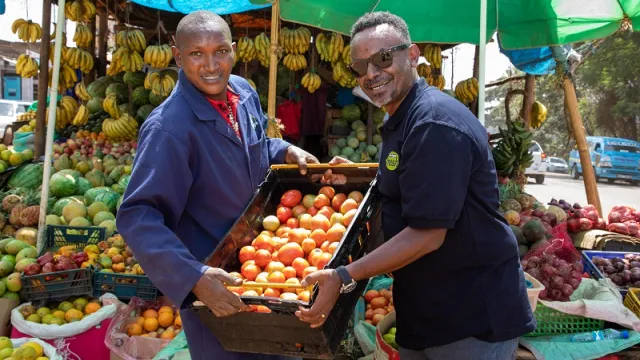Twiga Foods: We are not shutting down

Twiga Foods: We are not shutting down
Recent reports of workers' layoffs have led to perceptions of struggle, even a looming shutdown of Twiga Foods, a business-to-business e-commerce company that seeks to revolutionize supply chains.
Twiga Foods CEO and founder Peter Njonjo maintains that the company is on course, reshaping the way retailers access quality goods and services in Kenya while optimizing end-to-end supply chain solutions tailored to Africa's unique challenges and opportunities.
Partly backed by the World Bank's private venture unit International Finance Corporation (IFC), Twiga Foods was largely dependent on venture capital, a financing stream that has significantly dipped by 40 percent across Africa in the six months to June 2023.
"The current cost structure was built with the expectation that the company would be expanding across Africa. The availability of funding to do that in the short term is not available due to increases in interest rates in the US, which has impacted the available capital for investment in Africa and other emerging markets. So, in the short term, we can sustain the business with a 40 percent reduction in operating costs," explained Mr Njonjo in a wide-ranging interview on the company’s health.
Twiga Foods innovates amid high cost of capital
In the last 24 months, Twiga Foods, like a number of startups, faced the ripple effects of escalating capital costs brought about by evolving macroeconomic conditions. In particular, inflation manifesting in higher food and fuel prices has left Twiga Foods' order list shrinking significantly.
"In recent months, the basket size has also been reducing. A consumer’s purchase ability affects the average basket size, which is the count of the number of items a customer places with us. At Twiga, we actively track the basket size performance as it helps to support other backward integration factors, including production and supplier purchases necessitating a review of operation standards to enable us to deliver value to our customers," Mr Njonjo told Maudhui.
Higher fuel prices in Kenya have hit Twiga hard with Mr Njonjo saying "The cost of logistics does not support the shipping of product to Western Kenya and undertaking last mile distribution... due to the price sensitivity in those markets."
So, we are eliminating the last-mile delivery and finding a model that works, says the CEO, subtly signaling why the company has been downsizing.
However, the company demonstrated remarkable resilience in the face of adversity, says CEO. Adapting to the changing landscape, Twiga underwent strategic restructuring to ensure its ongoing viability.
The redundancy is on course, but within the provisions of the law: "For those impacted, August salaries for the days worked and notice served shall be paid via normal payroll at the end of the month. Notice period amounts shall be cleared at the end of the subsequent months and on an ex-gracia basis we will retain medical cover for all those affected until 31st December 2023."
Value-added services
This adaptation underscores Twiga Foods mission to provide retailers with affordable products and value-added services, irrespective of shifting market dynamics.
To counter the possible loss in business by shrinking manpower, Twiga Foods breathed new life into its Amana brand, a strategic move echoing its commitment to addressing changing consumer trends.
Launched in 2014, the Amana brand, initially centered around pulses and grains, but it is expanding to encompass an array of offerings including Premium Sugar, long-grain rice, and soon-to-be-launched pasta.
This expansion, Mr Njonjo notes, is geared towards capturing a larger share of the local packaged consumer staple foods market. This calculated step is aligned with Twiga's comprehensive food strategy, aiming to augment corporate value and amplify returns on investments for shareholders.
Read also: Unga Group’s Amana shines anew with an expanded portfolio
Paving Pathways to Growth
Twiga Foods leveraged the Kes23 billion raised over a decade to propel substantial growth. The CEO says capital infusion was strategically channeled into diverse initiatives, fortifying the company's market standing.
Notable among these ventures is a cutting-edge banana ripening facility, a mammoth operation capable of handling over a million bananas daily – a feat unparalleled in Africa.
Further, the establishment of a high-capacity distribution center in Tatu City, with a capacity of six million kilograms daily, has revolutionized the company's last-mile delivery. "We have served over 75,000 customers in the last financial year, saving them a fortune in trips to the market and last-mile logistics cost," notes Mr Njonjo.
Twiga's bold entry into farming, exemplified by its tomato and onion production in Taita Taveta County, has significantly slashed market prices, benefiting consumers and fostering sustainability.
"We ventured into farming [in Taita-Taveta County] in March 2022 through Twiga Fresh. This was influenced by the fact that sourcing was not helping us extensively meet our demand capacity. It is optimized to produce 300,000kgs of tomatoes and onions every day, at a price much lower than the market today, lowering the cost of food through achieving over 3x of average yields in Kenya," Mr Njonjo notes.
Leveraging tech for expansion
At the core of Twiga Foods' success lies its utilization of technology. Its ordering platform, Soko Yetu, empowers retailers to place orders in an efficient manner. Mr Njonjo says that Twiga's innovative sales scheme mode has empowered a network of over 1,000 agents, harnessing AI-driven geospatial clustering for optimized market coverage.
"We have lent Kes3.2 billion to over 33,000 customers since launching the working capital solution in partnership with local banks and other micro lending partners.
"We have built a sales agent technology platform that has made it possible to have people register as agents and operate in their local neighborhoods, thanks to an AI-powered geospatial clustering system that allows us to allocate over 100,000 shops," explained Mr Njonjo.
By harnessing the logistics marketplace and AI analytics, Twiga has reduced the need for delivery trucks by 40 percent, illustrating the transformational power of technology in driving operational efficiency.
Confronted by market challenges, Twiga Foods embarked on a bold restructuring plan to revamp its operations. Despite the operational adjustments, the founder says Twiga remains unwavering in its commitment to its core vision and mission.
This strategic reconfiguration, endorsed by shareholders, underscores Twiga's determination to pivot according to shifting market dynamics while upholding its promise of providing affordable goods and services.
"The company is not closing down, it is transforming its operations in Nairobi, Thika and Machakos for the last mile distribution and transitioning to a wholesale model for Western Kenya and Uganda," said Mr Njonjo.
Twiga Foods in Commercial farming
Nurturing smallholder farmers While Twiga Foods has ventured into commercial farming, its dedication to supporting smallholder farmers remains undeterred. A commitment to sourcing a diverse array of fresh produce from local small-scale farmers remains active. Twiga's practice not only sustains agricultural communities but also guarantees a high-quality, diverse product range for consumers.
"Our bananas come from farms in Meru, Murang’a and Tharaka Nithi counties. Potatoes from farmers in Nyandarua County where they are in abundance. We also source watermelons, oranges, carrots, and avocadoes especially when they are in season and can meet our demand capacity."
On why Twiga Foods exited Galana Kulalu, a politically-charged maize plantation project in a huff, the CEO says "Galana Kulalu is geared towards maize production, which is a primary commodity that falls outside of Twiga’s strategy. This led to Twiga giving up its rights in the Galana Kulalu Food security project to Selu Limited, who have invested and developed the concession to its current state."
Mr Njonjo notes that Twiga Foods stands as a transformative force in Africa's B2B e-commerce landscape. Driven by its vision of delivering value to retailers, farmers, and consumers alike, the company's trajectory is one of continuous innovation and adaptability. By harnessing technology, navigating market shifts, and strategically allocating funds, Twiga Foods is poised to redefine the contours of the food industry in Kenya and beyond. Anchored in a firm commitment to innovation and sustainability, Twiga Foods is the fusion of adaptability and purpose-driven growth.



